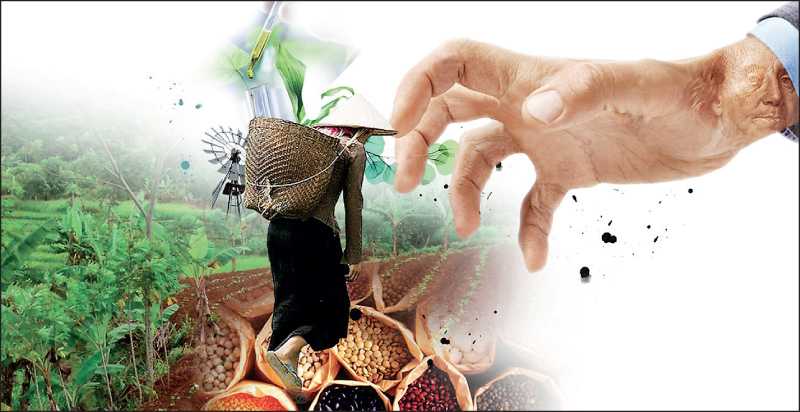Saturday Feb 28, 2026
Saturday Feb 28, 2026
Monday, 19 October 2020 02:28 - - {{hitsCtrl.values.hits}}

Credit NicolaL_s Medina Real World Radio
A new report launched last week exposes how agribusiness corporations like Nestle, Cargill, Unilever and Pepsico, together with the World Economic Forum, are using ‘sustainable agriculture’ initiatives to build public support for an environmentally and socially destructive model of food production, while undermining democratic and genuinely sustainable food systems.
With the backing of some high profile conservation NGOs, global agribusiness giants are using these initiatives to co-opt and weaken concepts of ‘sustainability’ and ‘agroecology’, allowing them to pursue a corporate profit-driven agenda and shape global public food policy in their interest.
‘Junk Agroecology: The corporate capture of agroecology for a partial ecological transition without social justice’ examines three high-profile public-private initiatives: ‘Sustainable Agriculture Initiative’ (SAI); ‘New Vision for Agriculture’ (NVA); and ‘New Food and Land Use Economy Coalition’ (FOLU).
It is published during a UN Committee on World Food Security virtual meeting in which world leaders are discussing how to transform global food systems and tackle the devastating impacts of COVID-19.
“Under the umbrella of public-private initiatives such as SAI, NVA and FOLU, global agrifood corporations are attempting to portray themselves as holding the solutions to problems they played a key role in creating. Their ‘junk agroecology’ allows them to continue profiting without addressing the socio-economic, political and ecological injustices on which the agrifood system is based, or the exclusionary and short-sighted ideology that legitimises it,” said Katie Sandwell from the Transnational Institute (TNI).
The global free market food system, based on industrial farming and commodity exports, has destroyed ecosystems and widened the hunger gap. COVID-19 has highlighted and exacerbated these existing inequalities.
“We are facing acute, interconnected crises – hunger, malnutrition, biodiversity loss, the climate crisis, growing inequality and poverty. What we need are real solutions, not more greenwashing from agribusiness. Real solutions – public regulation for agroecology and Food Sovereignty – require dismantling corporate power, redistributing resources, re-localising food systems and ensuring small scale producers have control. Food is a human right not a commodity,” said Kirtana Chandrasekaran from Friends of the Earth International. Agroecology is now recognised as a transformative solution for a food system in crisis by experts at the UN. It is a science, a set of practices and a social movement founded on principles of justice and solidarity. It aims to transform the industrial food system towards food sovereignty, building food systems based on local, fair and healthy production which respect diversity, culture, and peoples’ rights.
Where once agribusiness considered agroecology a threat, it is now selectively taking over some of its discourses, techniques and practices. The same agribusiness companies who fuel crises through land grabbing, destruction of natural ecosystems for monoculture, and speculation, now falsely claim to provide solutions via a complex network of public-private initiatives.
Their initiatives claim to promote smallholder farming, agroecology and gender justice whilst tackling climate change and biodiversity loss. Yet, they remain firmly rooted in the corporate agenda: increased production and intensification for profit, dependence on expensive technologies (from GMOs to digitalised farming practices), and expansion of market control. Furthermore, companies are increasingly invited into governance spaces, such as the UN Food Systems Summit, that should be democratic and led by the voices of those most affected by crises.
“By obscuring the differences between ‘agroecology’ and ‘climate smart agriculture’ or ‘sustainable intensification’, food giants and their networks in big NGOs are attempting to strip agroecology of its deeper meaning and transformational potential for peoples and planet,” said Martin Drago from Friends of the Earth International.
“Agribusinesses co-opt terms like ‘sustainability’ to greenwash their productivist and profit-driven agendas, creating a ‘junk’ solution which is as weak in substance as the junk food they have exported worldwide. ‘Junk’ agroecology represents a strategic corporate capture of the goals, discourses and practices of agroecology, the spaces where public policies are discussed, and the funds available for a much-need transition to genuinely sustainable food systems,” said Stefano Mori from Crocevia.
The full report can be accessed online via https://www.foei.org/wp-content/uploads/2020/10/Junk-Agroecology-FOEI-TNI-Crocevia-report-ENG.pdf